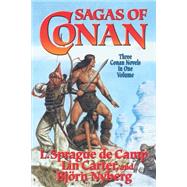
Note: Supplemental materials are not guaranteed with Rental or Used book purchases.
Purchase Benefits
What is included with this book?
| The Conan Saga | p. 14 |
| Legions of the Dead | p. 21 |
| The People of the Summit | p. 37 |
| Shadows in the Dark | p. 48 |
| The Star of Khorala | p. 69 |
| The Gem in the Tower | p. 90 |
| The Ivory Goddess | p. 109 |
| Moon of Blood | p. 126 |
| Table of Contents provided by Ingram. All Rights Reserved. |
The New copy of this book will include any supplemental materials advertised. Please check the title of the book to determine if it should include any access cards, study guides, lab manuals, CDs, etc.
The Used, Rental and eBook copies of this book are not guaranteed to include any supplemental materials. Typically, only the book itself is included. This is true even if the title states it includes any access cards, study guides, lab manuals, CDs, etc.
Excerpted from Sagas of Conan by Lin Carter, L. Sprague de Camp, Bjorn Nyberg
All rights reserved by the original copyright owners. Excerpts are provided for display purposes only and may not be reproduced, reprinted or distributed without the written permission of the publisher.